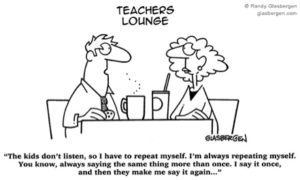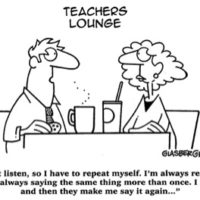Discussion is a key feature of learning, whether it be working in groups, think pair share, or engaging with a question and answer session. The spoken word is a frequent medium for learning. It follows that effective listening behaviours are necessary if the student is to access the learning.
Why then, do so many teachers despair over their students’ poor listening skills?
Listening operates at three levels:
- Listening to an expert (often but not always the teacher)
- Listening to a talk partner
- Listening across the classroom to peer responses
After decades of observing lessons, the evidence is that listening to the teacher and listening to a (single) peer is relatively well-developed in most students – although there are, of course exceptions!
However even when these skills are well-developed, students’ inclination to listen to their peer’s responses in class discussions is frequently poor. The teacher is displaying their outstanding questioning skills, drawing out and developing learning with an individual, hopeful that 25 others are listening to and also learning from the exchange. Too often though, it is one student ‘on the spot’ and 25 others having a bit of intellectual downtime. Why would students who have well-developed listening skills choose intellectual truancy over attentive listening in such circumstances?
The answer may lie in the unintended outcomes of our some of our teaching habits . . . .
How many of us are prone to repeating ourselves – for emphasis and to ensure that everyone has heard? Endlessly saying things time and again! Going back over it once more!! Reiterating it for emphasis!!! If you know it is coming round on a loop, why bother to tune in first time round?
How many of us elicit an answer from a student and immediately repeat it, louder, so that everyone hears? Why bother to listen to your friend if the teacher is going to repeat it anyway?
How many of us elicit an answer from a student, polish it slightly, put the emphasis in the correct place, and then paraphrase what the student originally said back to the class? Why listen to your friend if the teacher is about to give you the authorised version anyway?
In such ways do teachers unintentionally create the conditions for inattentive or selective listening.
The biggest problem would appear to be that teacher/student exchanges often resemble a game of table tennis – ping, pong, ping pong – all student responses going back to the teacher before another question is directed to another ‘victim’. Would it be better if class discussions resembled a game of basketball or volleyball, where the discussion bounces around the classroom and the teacher’s role becomes one of redirecting student answers to other students?
Teachers who achieve this say things like:
- Do you agree (or disagree) with that?
- Can you add anything to what xxx said?
- Who can build on that?
- Are you convinced by what xxx said?
- Can you explain what xxxx meant?
- Can you find a flaw in that argument?
- Can you defend that view?
- How would you challenge that viewpoint?
- Could you summarise what xxx just said?
- Do you think (s)he is right/wrong?
No repetition, just passing one answer on to another student for comment. And because the teacher does not repeat the original answer, students have to listen to their peers’ answers or put themselves at risk of being caught out.


No comments yet.